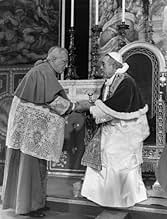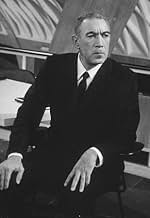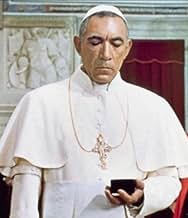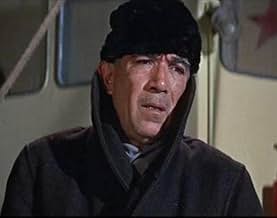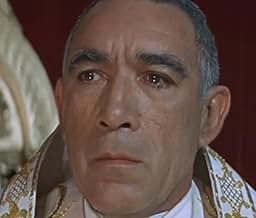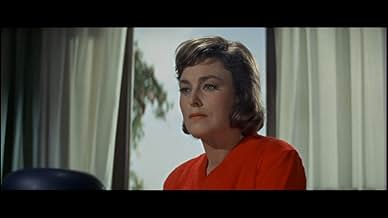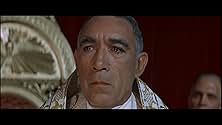O bispo russo Kiril Lakota é libertado de um gulag, vai para Roma, é feito cardeal e é eleito papa. Agora com os pés nas sandálias do "Pescador de Homens", tem de negociar um acordo difícil ... Ler tudoO bispo russo Kiril Lakota é libertado de um gulag, vai para Roma, é feito cardeal e é eleito papa. Agora com os pés nas sandálias do "Pescador de Homens", tem de negociar um acordo difícil entre a URSS e a China e travar uma guerra.O bispo russo Kiril Lakota é libertado de um gulag, vai para Roma, é feito cardeal e é eleito papa. Agora com os pés nas sandálias do "Pescador de Homens", tem de negociar um acordo difícil entre a URSS e a China e travar uma guerra.
- Direção
- Roteiristas
- Artistas
- Indicado a 2 Oscars
- 4 vitórias e 5 indicações no total
- Piotr Ilyich Kamenev
- (as Sir Laurence Olivier)
- The Elder Pope
- (as Sir John Gielgud)
- Chiara
- (as Rosemarie Dexter)
- Gelasio
- (as Arnoldo Foa')
- Gorshenin
- (apenas creditado)
- Direção
- Roteiristas
- Elenco e equipe completos
- Produção, bilheteria e muito mais no IMDbPro
Avaliações em destaque
This movie is not without its flaws. The editing is awkward and the film could have been tightened a bit (okay, a lot!). One of the things that bugs me is how the character of Cardinal Rinaldi (the Vatican Secretary of State played by Vittorio De Sica, who is pivotal in the early part of the movie) disappears in the second half without any explanation.
Also, the sub-plot with David Janssen as a philandering television reporter is annoying and superfluous. His only redeeming contribution is in how, during his reports, he provides good exposition about the traditions involved in burying one pope and electing the next.
But these things pale next to Oskar Werner's wonderful, understated perfomance as a philosopher/archeologist/priest who becomes friends with the soon-to-be Pope Kiril. (This character, Fr. David Telemond, is clearly based on Pierre Teilhard de Chardin.) The relationship of suspicion and affection between these two men is very engaging.
Werner has one of the best lines in the film when, after his character is censored by a pontifical commission, he says, "The Church. I hate her, still I cannot leave her. I love her, still I cannot live in her in peace." I think that line is beautiful and sums up the way many Catholics feel!
Finally, I have to say that I am not a big Anthony Quinn fan. I usually found him to be hammy. (I think he got a little too much mileage out of his Zorba schtick!) But in this film, he is wonderfully restrained. He gives a soulful performance as a reluctant hero who has suffered much and now only wants to be left in peace, but who also feels the call of his God and his fellow human beings. In my opinion, even though it is largely ignored by the critics, Quinn gave his best performance in Shoes of the Fisherman.
This is a moving but overlong film and in some moments results to be dull ; based on Morris L. West's best seller that contains drama , interesting world policy , emotion and historical events . Good film with thought-provoking issues and dealing with an Ukrainian's rise from a simple imprisoned priest to the college of Cardinals until becoming Pope . The film is pretty well but being wasted by a loving triangular drama between a reporter , spouse and girlfriend . Very good acting by Anthony Quinn as Pope Kiril I who must now deal with a lot of problems as his own self-doubt , the struggle of his friend priest and tries to fend off atomic war ; this type of treatment was a big turning point for Quinn . Reference is made to Kiril being the first non-Italian pope to be elected since Adrian VI 400 years earlier . In real life, this happened 10 years after this film was released with the election of Pope John Paul II .
The footage showing the arrival of the Cardinals and the crowds gathering in St. Peter's Square is taken from news reels and other archive films that documented the events between the death of Pope John XXIII and the election of Pope Paul VI in 1963 . Colorful and evocative cinematography by Erwin Hillier , filmed in Panavison . Rousing score by Alex North , though he reused the opening fanfare he wrote for 2001 (1968) but which had been rejected by Stanley Kubrick, as one of the main themes in his soundtrack . This epic point of view of a rise of an obstinate locked priest from a Siberian prison until Cardinal and Pope was well directed directed by Michael Anderson though emerge some flaws , being alternately compelling and uneven .
The performance of Anthony Quinn as Kiril I is truly outstanding -- his Ukrainian accent, his almost mystical yet practical manner and his eloquent speeches make this an Oscar-worthy performance (why he wasn't nominated, I'll never know). Oskar Werner as Fr. Telemond was equally touching. Flattered at being chosen to be the pope's friend, secretary and confidant, he comes to realize he has taught the pope many things while learning a few things himself. Thinly based on the life of Fr. Pierre Teilhard de Chardin, Oskar Werner gives a moving performance as the terminally ill, brilliant but troubled priest-philosopher-thinker. This is by no means a perfect movie --- some of the clothes are dated and the music at the party where the reporter meets up with his mistress is annoying. But minor flaws aside, this is a wonderful movie that gives tremendous insight into the workings of the Vatican, the papacy and even the human heart.
Você sabia?
- CuriosidadesIn the scene where Pope Kiril I (Anthony Quinn) prays over the body of the Jewish man, he recites the Shema. However, rather than say "Adonai," he says, "Hashem." This is because "Adonai" is traditionally only said when one is actually at prayer, and not simply reciting a prayer in a secular context, as in during a performance (specifically, in a movie).
- Erros de gravaçãoIn an on-air report, George Farber states, "after the sixth ballot, still only black smoke from the window of the Sistine Chapel." As a preceding shot demonstrated, the smoke rises from a stove pipe on the roof of the Sistine Chapel, not from a window.
- Citações
George Faber: Were you permitted to practice your ministry as a priest?
Kiril Lakota: No, I - I practiced it without permission among my fellow prisoners.
George Faber: Do you see any hope then for the day when Christian faith, or more specifically the Roman Catholic faith, may be practiced freely in Marxist countries?
Kiril Lakota: I have no inside information as to how the Kingdom of God is going to be established.
- ConexõesFeatured in The Shoes of the Fisherman (1968)
Principais escolhas
- How long is The Shoes of the Fisherman?Fornecido pela Alexa
Detalhes
- Data de lançamento
- País de origem
- Idiomas
- Também conhecido como
- Las sandalias del pescador
- Locações de filme
- PalaLottomatico, Roma, Lazio, Itália(meeting with Chinese leader)
- Empresa de produção
- Consulte mais créditos da empresa na IMDbPro
- Tempo de duração
- 2 h 42 min(162 min)
- Mixagem de som
- Proporção
- 2.35 : 1


